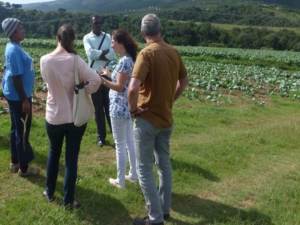Do you want to contribute to solving societal issues in the domain of food systems? Do you have a MSc degree in sociology, anthropology, development studies or related field with an interest in food systems? If yes, then we may be looking for you!
The Social Sciences Group (SSG) at Wageningen University is looking for a motivated PhD candidate to study relations between food system transitions and community resilience. The position is based in the Rural Sociology Group (RSO) and will be supervised by Professor Han Wiskerke and Dr Jessica Duncan with active supervision and collaboration with Dr Sietze Vellema from the Knowledge, Technology and Innovation Group (KTI), and Dr Marion Herens from Wageningen Centre for Development Innovation (WCDI).
Tag Archives: transition
Sustaining Dairy – PhD thesis by Georgina Villarreal Herrera
On Monday 26 June 2017 at 13.30 hrs Georgina Villarreal Herrera will defend her PhD thesis entitled ‘Sustaining Dairy’ in the Auditorium of Wageningen University. The ceremony will be live streamed by WURTV but can be viewed later as well.
The full thesis will be available online after the defence ceremony.
Summary of the PhD thesis
Dairy in Europe has undergone many changes in the last few years—the abolition of milk production quotas being a fundamental one. This study explores these changes in relation to the sustained social and environmental viability of the sector and how dairy processors’ sustainability programs are a part of that.
This study traces the evolution of the dairy sectors in the Netherlands, Ireland and the United Kingdom since the post-war era, outlining the dominant logic that has guided their development. The analysis shows that the post-war logic based on the increase of scale and intensification of dairying has continued to shape the development of the sector through today. While the visible impacts of intensive dairy have led to adaptations to the dominant rules and practices, these changes have not been fundamental in nature. The analysis of dairy processors and their sustainability programs revealed that these programs can be an additional tool for compliance to legal standards and the alleviation of pressing societal concerns. However, processors address social and environmentally relevant dairy-related challenges when an effective link to profit can be established. These programs have been unable to ensure that the dairy sector operates within established environmental limits and societal expectations, while providing a stable livelihood for farmers.
TRANSPLACE research project – connecting people to place
In 2014 the International Social Science Council launched a call for pre-proposals to apply for a ‘seed grant’ on the topic Transformations to Sustainability. Wageningen UR (Ina Horlings from RSO and Paul Hebinck from SDC), the Rhodes University and the University of Viçosa wrote a proposal together and received funding. The seed grant was used to build a knowledge network around this topic, locally in sites in the Eastern Cape in South Africa, the Minais Gerais in Brazil and in three different sites in the Netherlands. Furthermore the research partners met in South Africa in December 2014 to visit some sites and write a full proposal together. In the beginning of 2015 the organisation ILEIA, centre for learning on sustainable agriculture, joined the research consortium and in April 2015 a final proposal was submitted.
TRANSPLACE addresses concrete problems and sustainability issues across several linked areas of global environmental change in 9 specific social-ecological settings in South-Africa, Brazil and the Netherlands. Sustainability problems emerge from complex interactions between people’s livelihoods, the persistent poverty in the southern countries, growing inequalities between people, social discontent and health.
The integrative sustainability challenge is to support sustainable place-shaping as an empowering force of transformation – encompassing people, practices and policies – contributing to new forms of connectivity and co-creation between people and place. This occurs via, and helps us to understand, re-localization, transformative agency and the re-embedding of daily lived practices in social-ecological systems and place-based assets. This is considered as an empowering perspective and an effective starting point for sustainable place-based development.The central question is: How does place-shaping – understood as processes of connectivity- lead to new seeds of change contributing to transformation to sustainability?
TRANSPLACE aims to:
- address the temporal, historical, spatial, value-led and multi-scale aspects of sustainability in places and to connect people to place (landscape, nature, soil, people’s capacities) by identifying, supporting and replanting ‘seeds of change’ (innovative practices)
- establish (long-term) knowledge networks on different scales, facilitate transnational research collaboration and social learning and support early career scientists.
- co-create new knowledge, tools and policy-recommendations on processes of place-shaping as innovative transformative pathways to sustainability.
For more information, send a mail to: lummina.horlings@wur.nl


